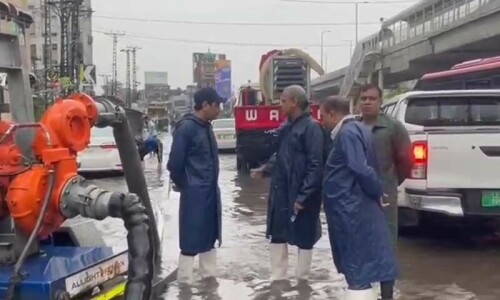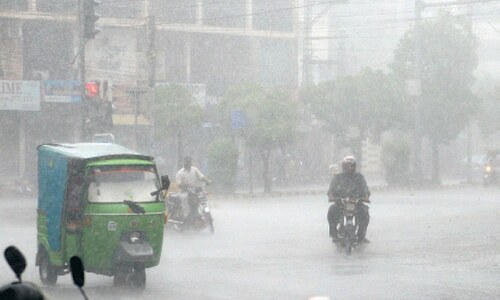Prime Minister Shehbaz Sharif on Tuesday formed a high-level committee to handle potential emergencies during the upcoming monsoon season.
A day ago, the National Disaster Management Authority (NDMA) activated its emergency centre in anticipation of rain in northern areas and Punjab.
The action was taken as the Pakistan Meteorological Department (PMD) predicted “vigorous” monsoon activity in the upper and central parts of the country during the week.
Chairing a review meeting to address the monsoon forecast and potential emergencies, the prime minister decided to personally supervise the response to any flood situations during the monsoon.
PM Shehbaz emphasised integrating advanced monsoon information into national broadcasts, stressing the regular dissemination of weather updates to farmers.
He assured full support to farmers during emergencies, emphasising the need for immediate assistance in such situations.
The premier instructed all relevant institutions to remain on high alert during the monsoon and directed the NDMA to support all provincial governments and related agencies.
The prime minister directed that advance information about the monsoon be disseminated to people in areas at risk of any emergency during the season.
He stressed that farmers and residents located near rivers and canals should be updated daily through the media and other information sources.
During the meeting, the NDMA provided a detailed briefing on the monsoon forecast and the areas at risk. The forum’s members were informed that heavy monsoon rains were expected in the four provinces during the first and second weeks of July.
They were also informed that this year’s monsoon rains would move from the southeast to the north with rainfall expected in the Potohar region and the eastern part of Punjab during the first week of July.
The participants were informed that in the second week of July, there was a possibility of heavy rains in Rawalpindi, Sargodha, Gujranwala, Lahore and Faisalabad, with scattered rainfall anticipated in Bahawalpur, Multan, Sahiwal and Dera Ghazi Khan divisions.
According to the NDMA briefing, a flood situation was expected in the Sutlej, Chenab, and Ravi rivers during the first two weeks of August with preparations for relocation and emergency responses completed in the areas surrounding these rivers.
In Sindh, Karachi, Mirpur Khas, Nawabshah, Sukkur and Hyderabad were expected to experience heavy rains in the second and fourth weeks of July. Additionally, monsoon showers were forecasted for Tharparkar, Badin, Thatta and Umarkot in the third week of August.
In Khyber Pakhtunkhwa, heavy rains were expected in Hazara, Malakand, Mardan, Peshawar, Kohat, Bannu and Dera Ismail Khan during July. The monsoon rains in the region wee expected to persist until the third week of August.
It was mentioned that in Balochistan, heavy rains were likely in the border areas with the Sindh coastal belt during the second and fourth weeks of July and the first two weeks of August.
Additionally, significant rainfall was expected in Lasbela, Armada, Khuzdar, Barkhan, Sibi and Zhob in the third week of August.
The meeting’s attendees were told that partial rains were expected in July in Gilgit-Baltistan, while large-scale rains were anticipated in the first three weeks of August, in Skardu, Hunza, Chilas and Ghizar.
It was stated that there was a possibility of heavy rains and landslides in Azad Jammu and Kashmir during the first three weeks of July.
The forum’s members were informed that adequate stocks of boats, tents, drainage pumps, medicines and other essential items were available and that preparations for the monsoon began in January with emergency response exercises ongoing since March.
The participants were briefed that rescue agencies, Provincial Disaster Management Authorities (PDMAs), Pakistan Army troops and the NDMA remained on high alert in the areas at risk.
They were also told the NDMA had launched a mobile phone application for monsoon alerts, weather conditions and advance information which was being actively utilised by the public.
It was explained to them that a National Monsoon Contingency Plan was drafted and distributed to relevant institutions and provincial governments to manage any monsoon-related emergencies.
The chief secretaries of the four provinces briefed the attendees on their respective action plans to manage the monsoon season and respond to any associated emergencies.













































Dear visitor, the comments section is undergoing an overhaul and will return soon.